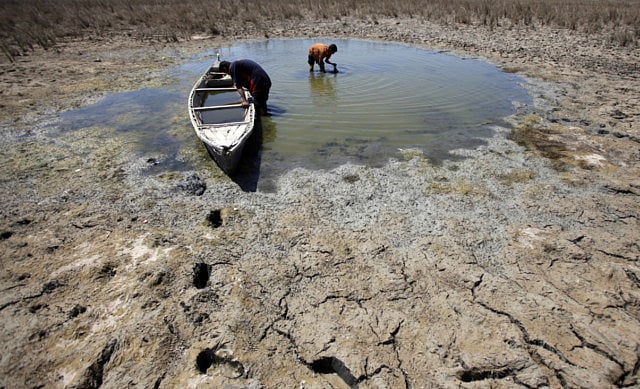London: They are thought to be the site of the Garden of Eden, but Saddam Hussain turned them into hell on earth. Yet now, largely through one man’s vision and sacrifice, the Mesopotamian marshes have been sufficiently restored for much of them to have been designated as Iraq’s first national park.
Fed by the great Tigris and Euphrates rivers, the marshes were once the largest and richest in wildlife in the Middle East, and — at some 7,700 square miles — the third most extensive in the world.
More than five millennia ago, much of the modern human story began around their shores, as writing and the wheel were invented, agriculture was developed and early cities took root.
After the great Sumerian civilisation declined and fell, its descendants lived on in a world of water amid the desert, their way of life little changed from that depicted on clay tablets from 3,500BC.
Fifty years back, explorer Wilfred Thesiger, who lived for months in the marshes, wrote of “stars reflected in dark water, the croaking of frogs, canoes coming home at evening, peace and continuity and the stillness of a world which never knew an engine”. He is echoed by Azzam Alwash, who used to visit them as a child. “I remember looking into deep, deep clear waters and seeing large fish darting away,” he told me, “and black clouds of birds in the blue sky. Words cannot describe the beauty of the place.”
It wasn’t to last. Shiites who had risen against Saddam took refuge in the marshes, making the president determined to destroy a traditional sanctuary for dissidents. Over the next few years he obsessively drained the wetlands, constructing six giant waterways — with names like Saddam River and Loyalty to the Leader Canal — and thousands of miles of embankments.
Environmental disaster
The marshes were shrunk by 93 per cent — and their people, once hundreds of thousands strong, to some 20,000 — in what the United Nations Environment Programme described as the greatest engineered environmental disaster of the century. In Alwash’s words: “A once-beautiful green Eden became a salt-encrusted desert.”
By this time, having fled the regime’s persecution aged 20, he was living “the American dream”, married with two daughters, in an affluent Los Angeles suburb, with “a wonderful job” as an engineer.
But when Saddam fell, he decided to give all that up in order to go back and try to bring the “cradle of civilisation” to life. Expert after expert told him it could not be done but, as Alwash, now aged 55, has said, he doesn’t let himself “be constrained by reality”.
He set up an environmental organisation, and set to work coordinating haphazard breaches in the embankments already being made by local people and developing a master plan. “I hadn’t planned to be a hero,” he now says. “I was foolish enough to think it could be a two-year project.” Instead he has now been at it for a decade, often in danger in a country with little law and order, revisiting his home and family only “twice a year, for two weeks at a time”.
Species recolonising
Despite his family’s support, he desperately misses watching his children grow up but adds: “The honest truth is that I could not give up.” And nature has rewarded him. More than half the marshlands have now been restored. All their previously recorded 278 species of birds appear to have survived in small pockets and are now recolonising them: there are thought to be some 43,000 marbled teal, a species that long seemed to have vanished.
Otters and other wildlife once thought extinct have returned and the people of the marshes are coming back, able again to make a living. There’s still a long way to go in what Alwash now realises is a “multi-lifetime” effort. “It now looks the same, and feels the same as in my childhood,” he says, “but my gut knows it is not yet the same.”
And threats continue. Turkey is building more than 20 dams across the Tigris and Euphrates upstream, increasingly choking off the spring-time pulse of meltwater from the mountains that has always given life to the marshes.
Alwash — who this year won the Goldman Environmental Prize for grassroots activists, which I help to judge — is drawing up plans to recreate it artificially while persuading his countrymen not to waste water.
Even so, the revival of the marshes — and the designation of the national park — is changing the fate of the Garden of Eden from one of the world’s worst environmental catastrophes to an example of how other lost wetlands could be restored worldwide. Who, you might ask, would Adam-and-Eve it?
— The Telegraph Group
Limited, London 2013
Sign up for the Daily Briefing
Get the latest news and updates straight to your inbox
Network Links
GN StoreDownload our app
© Al Nisr Publishing LLC 2026. All rights reserved.
